How to replace the auger belt and ground drive belt in a snowblower
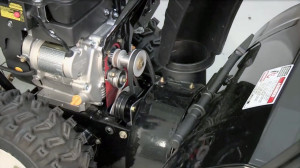

The auger belt and drive belt in your snowblower wear out over time.
When the augers don’t spin when you engage the auger control lever and the auger cable is adjusted properly, you may need to replace the auger belt.
You’ll need to check the ground drive belt for wear when it doesn’t spin the drive plate to move the wheels when you engage the drive control lever. Replace the ground drive belt when it’s worn or damaged.
When you need to replace either one of these snowblower belts, it’s best to replace both belts at one time. If one belt is worn out, the other belt likely isn’t far behind in wear. Replacing both belts at once will save you from disassembling the auger and ground drive systems twice within a short period of time.
Replacing these belts regularly as a step in routine maintenance will also prevent snowblower problems in the middle of winter—when you may not be able to get a replacement belt quickly so you can keep clearing snow.
How to replace the auger belt and ground drive belt
Wear work gloves to protect your hands during this repair.
Drain all fuel from the engine’s gas tank to fuel doesn’t spill when you tip the snowblower over to access the belts.
Reposition the drift cutters if necessary so that you can tip the snowblower over to rest on its auger housing when replacing the belts.
Remove the belt cover mounting screws and pull off the belt cover.
Roll the auger belt off the engine pulley.
Use a wrench to pivot the ground drive belt idler pulley outward to release drive belt tension. Lift the ground drive belt off the engine pulley.
Carefully tip the snowblower over onto its auger housing.
Remove the frame cover from the underside of the snowblower.
Loosen and remove the shoulder screw which acts as a belt keeper for the auger pulley.
Unhook the auger brake bracket spring from the frame.
Depress the ground drive lever and use a clamp to hold the lever to the handle bar.
Remove the auger belt.
Remove the clamp holding the ground drive lever to the handle bar.
Remove the stop bolt to allow the drive plate support bracket to pivot down and increase clearance between the drive plate and the friction wheel.
Slip the ground drive belt off the drive plate and work it out of the snowblower.
Slide the new ground drive belt under the friction wheel and around the drive plate and through the auger housing.
Reposition the drive plate support bracket to its proper position and reinstall the stop bolt.
Depress the ground drive lever and clamp it to the handle bar.
Install the new auger belt around the auger pulley. Push the other end of the belt through the auger housing.
Reinstall the shoulder screw.
Reconnect the brake bracket spring to the frame and brake bracket.
Reinstall the frame cover and secure it with its mounting screws.
Carefully tip the snowblower back onto its wheels.
Use a wrench to pivot the ground drive belt idler pulley outward and install the new ground drive belt on the engine pulley. Slowly release the idler pulley to exert tension on the drive belt.
Roll the new auger belt onto the engine pulley.
Reinstall the belt cover and secure it with its mounting screws.
Test snowblower operation
You may need to adjust the ground drive control cable and auger control cable after installing the new belts because the new belts are likely shorter and have more tension than the old belts.
Check Ground Drive Operation
Use our How to adjust the snowblower drive control cable video/article as a guide for checking and adjusting the ground drive control cable.
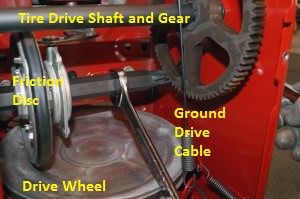
When you engage the ground drive lever, the ground drive cable pulls the drive wheel up to rub against the friction disc. The friction disc rotates the hex drive shaft which spins the gear and shaft that moves the tires (see the image to the right).
You can test ground drive cable tension with the snowblower shut down. With the ground drive lever disengaged, lift the auger housing up slightly and push the snowblower forward. The snowblower should roll freely because the spinning drive wheel isn’t touching the friction disc.
If the snowblower doesn’t roll freely with the ground drive lever disengaged, you’ll need to loosen the ground drive cable tension. That will release the drive wheel from the friction wheel so the snowblower doesn’t creep forward with the drive lever disengaged when the engine is running.
Next, engage the ground drive lever and see if the snowblower moves freely. The wheels should be locked up when the ground drive lever is engaged because the drive wheel should be up against the friction disc—preventing the wheels from turning.
If the wheels turn freely with the ground drive lever engaged, then you’ll need to tighten the ground drive cable tension because the cable isn’t pulling the drive wheel up far enough to engage the friction wheel.
Start the snowblower and test ground drive control operation. Continue to adjust the ground drive cable if necessary until the ground drive control operates properly.
Shut off the snowblower engine and check the auger control system.
Check Auger Control Operation
Use our How to Adjust a Snowblower Auger Control Video to guide you in adjusting the auger control cable.
Follow these steps to check the auger control:
With the auger control lever disengaged, check the auger control cable tension. The auger control cable should have slack so it’s not pulling the idler pulley.
Start the snowblower and check to see if the auger moves with the auger control lever disengaged. With the auger lever disengaged, the auger shouldn’t move.
Engage the auger and let the augers run for about 10 seconds then disengage the auger.
Cycle the auger on and off in a similar manner several times.
Check the auger to see whether it stops completely with the auger control lever disengaged.
See if the auger spins properly with the auger control engaged.
Shut off the snowblower and adjust the auger cable if necessary.
Adjust the auger cable
If the auger spins with the auger control lever disengaged, you’ll need to increase auger cable slack. If the auger doesn’t move with the auger control lever engaged, you’ll need to increase auger cable tension.
Follow these steps to adjust auger cable tension:
Loosen, but don’t remove, the upper hex bolt on the rear auger drive cable bracket.
Loosen, but don’t remove, the lower hex bolt on the rear auger drive cable bracket if necessary to the bracket slides up and down.
Move the bracket upward to provide more auger cable slack or downward to apply more tension on the auger cable.
Hold the bracket in place after adjusting its position and tighten the hex bolts.
Test the auger control system and continue to adjust auger cable tension if necessary so the auger spins properly.
Replacing the belts regularly on your snowblower will keep it working smoothly all season long.
Don’t forget to tune up the snowblower engine and lubricate the moving parts of the machine regularly as well. Our How to tune up a snowblower video will guide you through that process.
Instead of doing it yourself, you can schedule Sears Home Services Snowblower Maintenance Service to have a Sears Technician complete the tune up and lubricate your snowblower.
Symptoms for gas snowblowers
Choose a symptom to see related snowblower repairs.
Things to do: replace the spark plug, change the oil, rebuild the carburetor, adjust valve lash, adjust or replace the b...
Main causes: clogged chute, damaged auger blades, broken shear pins, worn auger belt, damaged gear case, engine problems...
Main causes: dirty carburetor, stale fuel...
Main causes: punctured tire, damaged rim...
Main causes: dirty carburetor, clogged fuel filter, dirty spark plug, incorrect valve lash, leaky engine gaskets...
Main causes: stale gas, clogged carburetor, clogged or broken fuel line, dirty spark plug, bad rewind starter, incorrect...
Main causes: loose drive clutch cable, damaged drive clutch cable, worn friction disc, scraper blade scraping the ground...
Main causes: snow build-up in chute, chute drive mechanism failure, bad chute control assembly...
Main causes: clogged chute, snow build-up in auger housing, broken auger shear pins, auger drive belt needs adjustment, ...
Repair guides for gas snowblowers
These step-by-step repair guides will help you safely fix what’s broken on your snowblower.
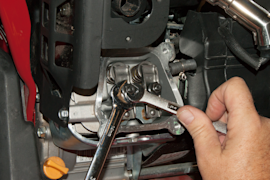
How to adjust snowblower engine valve lash
Adjust the engine valve lash on your snowblower to keep the engine starting and running smoothly....

How to adjust snowblower skid shoes
To prevent snowblower auger and shave plate damage, adjust the skid shoes regularly to keep the shave plate ¼-inch high....
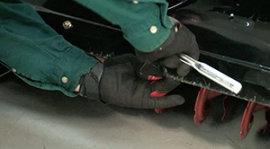
How to replace a snowblower shave plate
Follow the 7 easy steps in this repair guide/video to replace a worn out shave plate on your snowblower....
Articles and videos for gas snowblowers
Use the advice and tips in these articles and videos to get the most out of your snowblower.
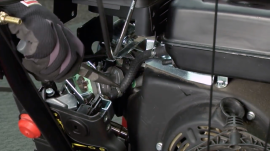
Get an overview of the main steps in a snowblower tune-up and click to videos with more details....
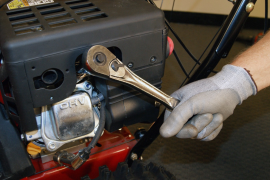
Get your snowblower ready for winter before winter arrives, so you don't have to mess with it while snow piles up....
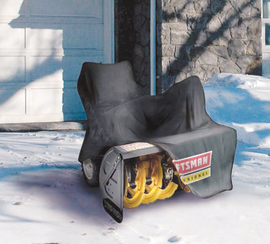
Protect your snowblower's engine and body by preparing it for after-season storage....